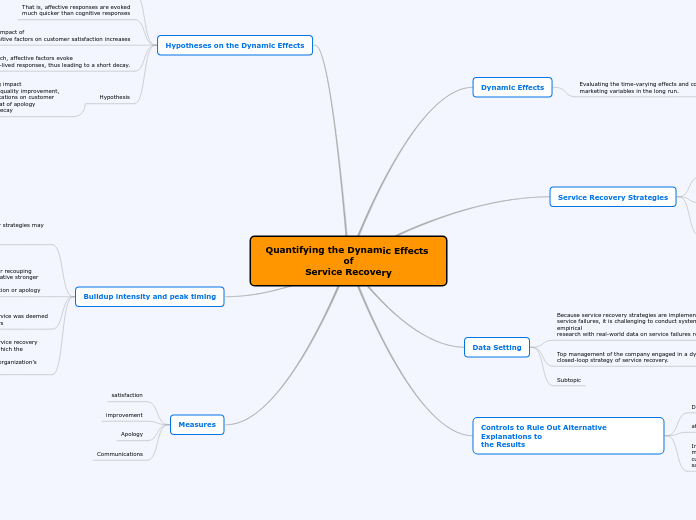Quantifying the Dynamic Effects of
Service Recovery
Dynamic Effects
Evaluating the time-varying effects and contribution of marketing variables in the long run.
Service Recovery Strategies
Recovery management has a significant impact on customer
evaluations
customers are usually more emotionally
involved in recovery than in routine or first-time service
Companies known for excellent service go the extra
mile to cover all the costs a failure incurs. If the inconvenience
is so severe to customers
Data Setting
Because service recovery strategies are implemented after the service failures, it is challenging to conduct systematic empirical
research with real-world data on service failures recovery
Top management of the company engaged in a dynamic,
closed-loop strategy of service recovery.
Subtopic
Controls to Rule Out Alternative Explanations to
the Results
During the recovery process, customer satisfaction may be
affected by other factors, for which we need to control.
In addition, major economic events such as financial crisis may affect
customer spending and, thus, may impact customer satisfaction
Hypotheses on the Dynamic Effects
Do the effects of service recovery strategies on customer satisfaction
That is, affective responses are evoked
much quicker than cognitive responses
the impact of
cognitive factors on customer satisfaction increases
As such, affective factors evoke
short-lived responses, thus leading to a short decay.
Hypothesis
After service failures, the time-varying impact
of service recovery strategies such as quality improvement, compensation, and marketing commutations on customer satisfaction has a long decay, while that of apology
on customer satisfaction has a short decay
Buildup intensity and peak timing
Besides decay heterogeneity, service recovery strategies may vary in terms of buildup
intensity and timing of the peak impact.
Many scholars have
identified the dominant importance of quality improvementbased service recovery efforts for recouping customer satisfaction, thus suggesting the relative stronger buildup effects of
quality improvement than those of compensation or apology
The survey also found that the offer
of free goods or services following poor service was deemed
important by less than 5% of the customers
According to the social exchange theory, a service recovery
encounter can be viewed as an exchange in which the customer
experiences a loss due to the failure and the organization’s
ic
Measures
satisfaction
improvement
Apology
Communications
